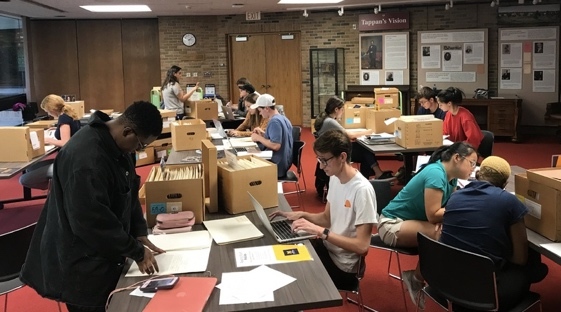4. About the Project
Detroit Under Fire: Police Violence, Crime Politics, and the Struggle for Racial Justice in the Civil Rights Era is a book-length digital exhibit published in March 2021 and created by the Policing and Social Justice HistoryLab, an initiative of the University of Michigan Department of History and a component of the U-M Carceral State Project's Documenting Criminalization and Confinement initiative. The research team--sixteen undergraduate students, one graduate student lab supervisor, and one professor--began constructing Detroit Under Fire and the five accompanying Arc GIS StoryMap exhibits during the Fall 2018 semester in History 393: "Cold Cases: Police Violence, Crime, and Social Justice in Michigan."
Detroit Under Fire is a pilot project of the UM HistoryLabs program, established in 2018 by the History Department to promote public engagement, student-faculty scholarly collaborations, and digital humanities. This exhibit, covering the period from 1957-1973, is also the first installment of a broader curricular and extracurricular project by the Policing and Social Justice HistoryLab to research and document the history of policing and criminalization in Detroit throughout the twentieth century; to analyze the politics of crime control and civil rights activism; and to excavate and map police-civilian encounters, including homicides, brutality, and misconduct. Visit the overall project site of the Policing and Social Justice HistoryLab for all research publications.
Research Archives: The design of Detroit Under Fire combines historical narratives with around 1,500 archival documents, photographs, and video clips--allowing audiences to explore original sources and multiple perspectives in depth. The team conducted much of this research at the Walter P. Reuther Library at Wayne State University in Detroit, the Burton Historical Collection of the Detroit Public Library, and the Bentley Historical Library at the University of Michigan. We thank these archives and their dedicated archivists for their support as well as permission to reproduce these documents and images for a public audience. The Policing and Social Justice HistoryLab also thanks LSA Instructional Support Services at U-M for providing funding for the Detroit policing project through the "New Initiatives/New Infrastructure: Diversity, Equity, and Inclusion" grant program.
Citing this Exhibit and Reproducing Materials. The preferred citation is
- Matthew D. Lassiter and the Policing and Social Justice HistoryLab, Detroit Under Fire: Police Violence, Crime Politics, and the Struggle for Racial Justice in the Civil Rights Era (University of Michigan Carceral State Project, 2021), <https://policing.umhistorylabs.lsa.umich.edu/s/detroitunderfire/page/home>.
- To cite a specific webpage within the exhibit, include the webpage title along with the above material but use the distinct url.
- General bibliographic information is at the bottom of each webpage, while full citations for documents reproduced are under the "Source" category on the jump page. To cite a specific document that this exhibit reproduces from the archives, please include the document title and date, followed by "reproduced in [full exhibit citation], followed by the distinct url of the jump page.
- All documents reproduced in this exhibit are either public domain, subject to fair use, or copyrighted and used with permission. In many cases, the original archive retains the copyright, and further reproduction for public use without express authorization is prohibited. To inquire about reproducing a document from this exhibit, send an email to the contact address below.
Feedback and Research Ethics: Difficult questions regarding research ethics and complex issues of publicity vs. confidentiality are involved in the construction and publication of an online digital exhibit about state violence, crime and criminalization, surveillance and protest. Please see the Overview section and the Politics and Silences in the Archives page for elaboration.
Contact Information: Please send any feedback or inquiries about the Detroit Under Fire exhibit--including requests for removal of personal material, and contributions of personal stories and documents to fill in gaps in the archives--to detroitunderfire@umich.edu or directly to Professor Matt Lassiter (mlassite@umich.edu), the lead author and editor of Detroit Under Fire and the director of the Policing and Social Justice HistoryLab.

